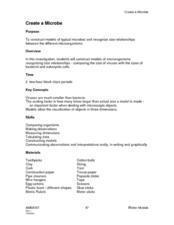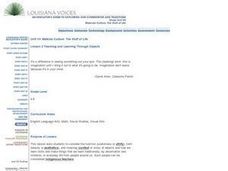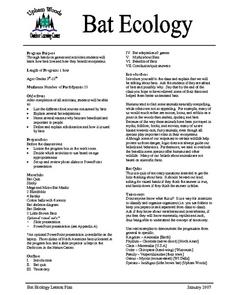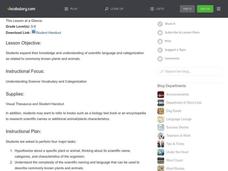Curated OER
Chicago: The City in Art, 1995-2000
Students examine a mural of animals and talk about animal classification. They act as scientists and keep a record, called a Jungle Journal, of plants and animals they observe while studying the rainforest.
Curated OER
The Game of Life
Learners describe what it means for a marine animal or fish to be threatened or endangered after playing game simulating extinction.
Curated OER
Create a Microbe
Young scholars construct models of microorganisms recognizing size relationships-comparing the size of viruses with the sizes of bacterial and eukaryotic cells. They put into perspective just how small microbes are by comparing the size...
Curated OER
Investigating Animals in Soil
Students investigate and observe small animal activity on a plot of land on their school grounds. In small groups they identify the five kingdoms of animals, stake out a small plot of ground, collect samples, record and analyze any data...
Curated OER
Biodiversity
Students investigate the diversity of temperate forests and tropical rainforests. They catch and observe local insects, sort leaves and insects on a chart, listen to the book "A Walk in the Rainforest," and create a class bar graph that...
Curated OER
Down, Dung and Dirty
Students observe the changes seen in succession and the biodiversity of a community through its species richness and evenness. They create a dung culture in a clear plastic cup from horse, goat or cow dung then observe the numbers of...
Curated OER
"Five Little Seeds"
Fourth graders complete various activities related to the plant life cycle. They read the book "The Tiny Seed," read and discuss the poem "Five Little Seeds," complete a "Plantenstein Mystery" and other online activities, write and...
Curated OER
Animal Classification
Third graders differentiate between vertebrates and invertebrates, and identify the main characteristics of mammals, fish, reptiles, amphibians, and birds. They sort and categorize different types of balls, discuss the characteristics...
Curated OER
Fertilizers, Pesticides and Human Health
Students define several vocabulary terms related to chemicals and toxicology. Students calculate chemical concentrations in water and explain the toxicological principles that govern safety of substances. Students conduct an...
Curated OER
Predator Or Prey?
Students study the concept of predator/prey by researching specific examples of birds. They participate in a concept map/webbing activity to determine different characteristics of birds. They engage in a class discussion about...
Curated OER
Mystery Creek
Fourth graders are introduced to the Riparian Ecosystem. They define the following terms: riparian and riparian ecosystem. Students take a trip to the creek, where they make observations about the environment around them. They are...
Curated OER
Revolutionary War
Students identify and research significant people, causes, and primary documents of the U.S. Revolutionary War. They create a class Revolutionary War web using Inspiration computer software, write a journal depicting three days in the...
Curated OER
Civil Rights Movement
Students identify and acquire an understanding of what the Civil Rights Movement consisted of, the issues that sparked the Movement, the people who participated and the events that occurred during the Movement. They also identify how to...
Curated OER
The First North Americans
Students identify and interpret the different North American Indian groups, by region, and the type and impact of their interaction with Europeans.
Then they complete an overview of one main Native American group during the age of...
Curated OER
Teaching and Learning Through Objects
Students identify and interpret the function, usefulness or utitlity, form, beauty or aesthetics, and meaning, context or story, of objects and how they learn new skills and make things that they learn traditionally, by observation and...
Curated OER
Bat Ecology
Young scholars, through hands on games and activities, discover how bats live and how bats benefit ecosystems. They play a game designed to show them how echolocation works and another to show how mother bats locate their young through...
Curated OER
Diatoms of Laboratory Indicators of Water Quality
In this science worksheet, high schoolers use the diatoms present in water in order to test water quality and perform data collection and interpretation.
Curated OER
Sedimentary Rocks
In this sedimentary rock worksheet, students answer 9 fill-in-the-blank questions and 8 matching questions regarding sedimentary rocks and their formation.
Curated OER
Mighty Microbes
In this mighty microbes worksheet, students read for comprehension assessment. In this fill-in-the-blank and true and false worksheet, students answer ten questions.
Curated OER
Introduction to Chemistry
In this introduction to chemistry worksheet, students answer 9 questions regarding the study of chemistry. The first part is matching, then they "think like a scientist" and then they problem solve.
Curated OER
Amoeba
In this amoeba worksheet, students read about the structures of the amoeba and their functions. They answer twelve questions about the amoeba and color given structures on a diagram of an amoeba.
Curated OER
The Euglena and Spirogyra
For this Euglena and Spirogyra worksheet, students read about these two Protozoans and they answer fourteen questions about their specified structures and functions. They color a diagram of Euglena and Spirogyra and label their parts.
Curated OER
Understanding Science Vocabulary and Categorization
Students analyze scientific vocabulary words. In this life science vocabulary lesson, students complete a worksheet using VisualThesaurus as they evaluate words related to plants and animals and how the words are used.
Curated OER
Homeless in our Community
Third graders explore homelessness in their local community. In this service project/social studies lessons, children research local areas where homeless people reside, discuss global acceptance and unity, and visit a local food bank.

























